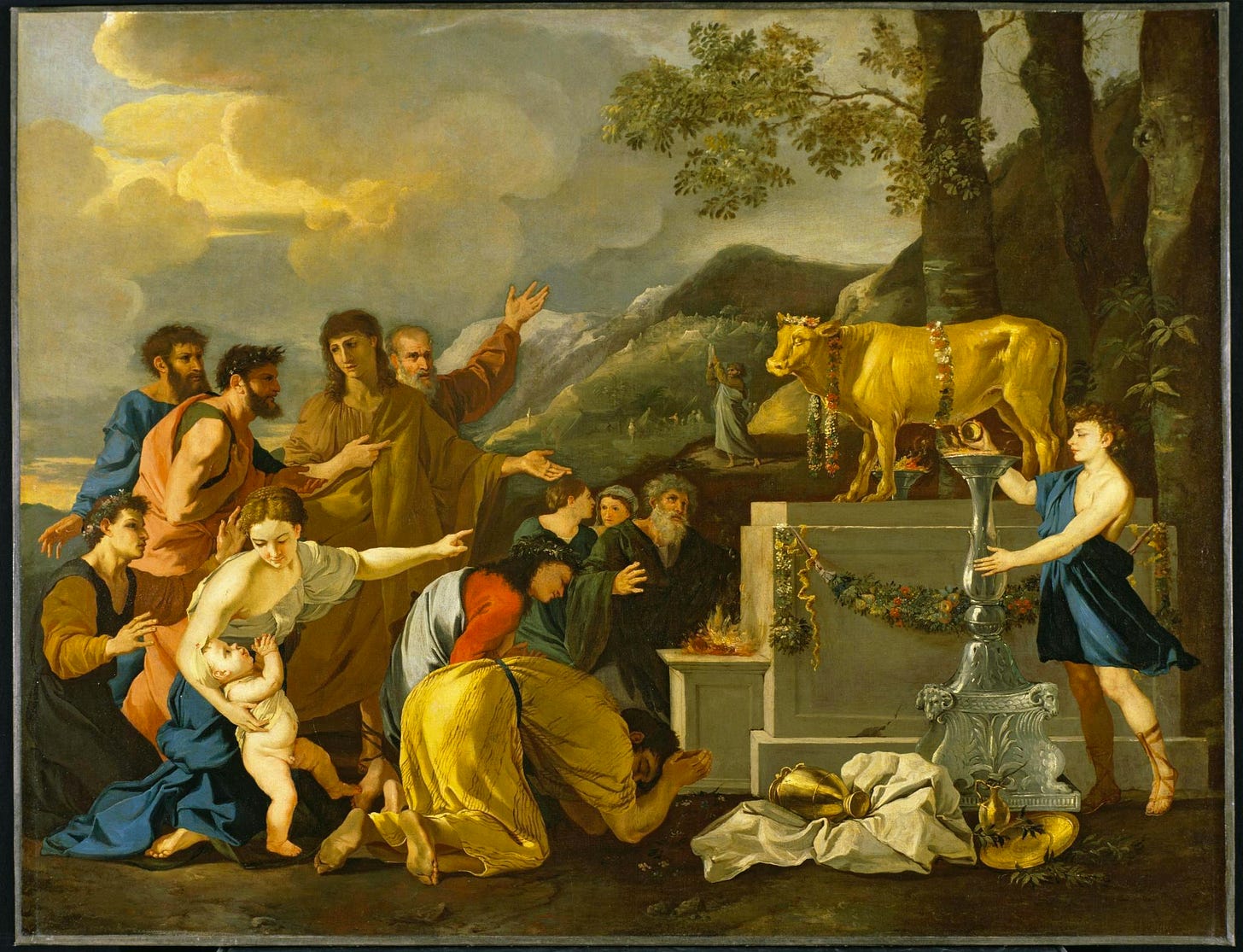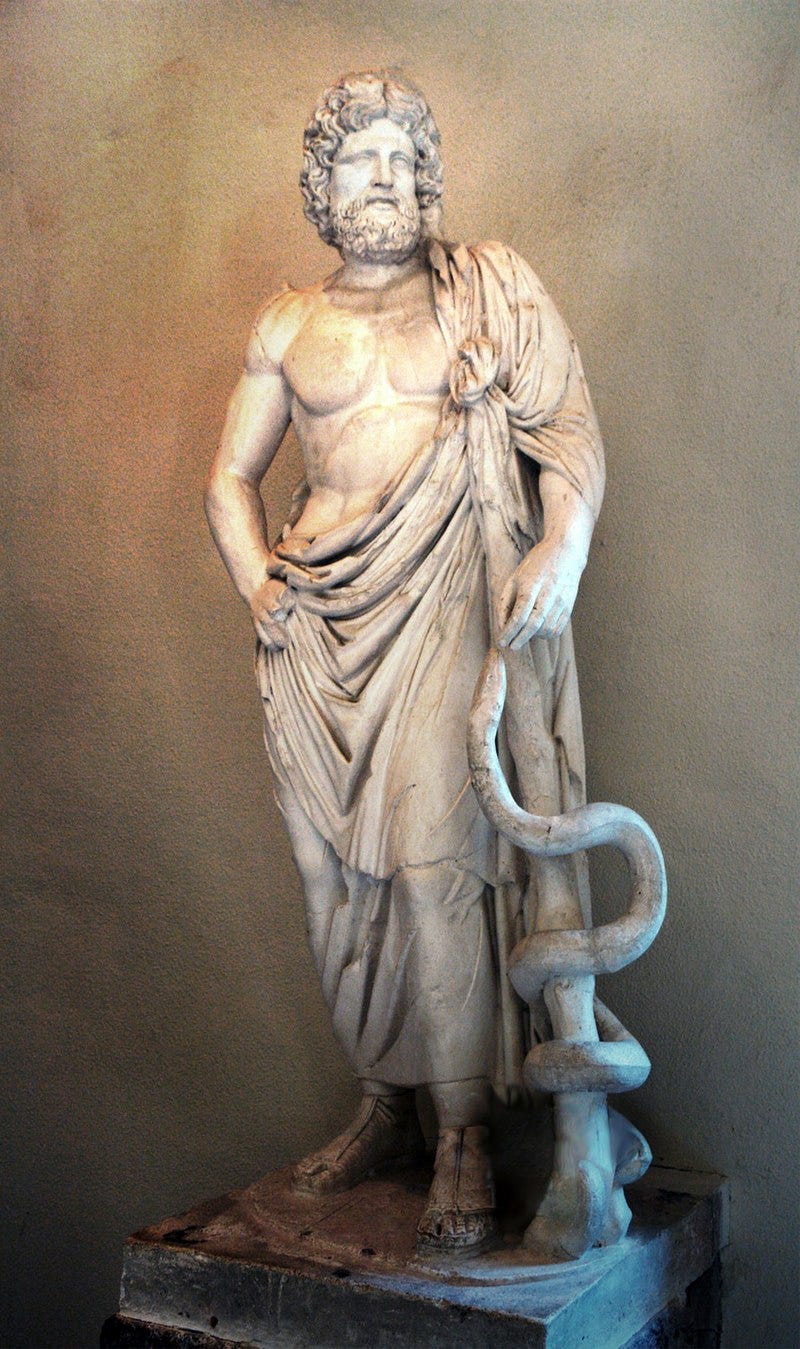When Moses went up the mountain to speak with God, while God was inscribing His commandments on stone for Moses, impatience overcame the Israelites. Concerned for when Moses would return or whether he ever would, the Israelites sought out Aaron and urged him to create for them “gods” to go before them. When Aaron crafted a calf from the gold jewelry the people provided, they bow down to it, made offerings to it, and celebrated it. The Israelites worshipped a false god, and this would not be the only time.
Many who claim to be Christian would never stop to think whether they worship a false god - after all, they believe they are Christians and worship the God of the Bible. They don’t bow down to idols, nor do they pray to Vishnu or anything of that sort. Many Christians do, however, much like the Israelites awaiting Moses’ return from the mountain, worship a god of their own making.
How often have you heard someone say, “my god wouldn’t <fill in the blank>….” or “God is love, and if He was to <fill in the blank>, that wouldn’t be very loving”? Both of these demonstrate a distorted understanding of Scripture and of the nature of God.
The phrase, “my god wouldn’t…” or “my god doesn’t…” exhibits explicitly a belief in a self-made god. When a person uses this phrase, what follows usually contradicts Scripture. An example would be, “my god wouldn’t condemn people just because of who they love,” or, “my god wouldn’t punish someone for lying,” or even, “my god wouldn’t send someone to hell just for not believing in Jesus.” Those advocating such a position have fashioned a god who will overlook sin - not necessarily all sin - sin that typically holds a personal interest the one molding such an idol. This person will usually attempt to justify the sin in question by sidestepping or explaining away passages of Scripture that condemn the particular activity. In so doing, this individual ignores God’s disclosure of Himself and what He defines as sin, thus this individual also rejects the God of the Bible Himself.
The phrase, “God is love, and to <fill in the blank> isn’t loving” or “God is love, and a loving god wouldn’t <fill in the blank>” indicates a different type of error leading to the worship of a false god. Again, this is a god created in the mind of the believer, but rather than being based strictly on the emotion of the believer, it is the result of over-emphasizing one of God’s attributes over and above, or to the exclusion of, the rest of God’s attributes.
At the very least, aside from love, God has revealed to us the following of His attributes:
God is jealous of our worship (Ex. 20:5, 34:14, )
God is just and desires justice (Lev. 19:36; Isa. 30:18; Rom. 9:14)
God is a consuming fire (Ex. 4:24; Heb. 12:29)
God is an avenging God (Nah. 1:2; Rom. 12:19; Heb. 10:30)
God is holy (Lev. 11:44, 21:8; 1 Pet. 1:16)
God can send evil spirits to do His bidding (Judges 9:23)
God disciplines His children (Deut. 4:36; Prov. 3:11; Heb. 12:5)
God punishes (Ps. 59:5; Jer. 50:18)
God is wrathful (Jn. 3:36; Rom. 1:18; Eph. 5:6; Rev. 14:10)
God does not/cannot lie (Num. 23:19; Tit. 1:2)
God (alone) is good (Mk. 10:18; Lk. 18:19)
God is faithful (Deut. 7:9; 1 Cor. 1:9; 2 Cor. 1:18)
God is slow to anger (Ex. 34:6; Ps. 86:15; Joel 2:13)
but God gets angry (Num. 22:22; 1 Ki. 11:9; Ps. 60:1)
God is unchanging (Jas. 1:17)
God is righteous (Ezra 9:15; Job 7:11; Isa. 45:21)
God is spirit (Jn. 4:24)
God is light (1 Jn. 1:5)
This is a dreadfully incomplete list, though it is complete enough to demonstrate that there is far more to God than simply “love.” Likewise, when someone makes a statement preceded by “God is love,” the love to which the person refers is usually a touchy-feely emotion, not God’s ἀγάπη (agape) love, a purposeful, willful, sacrificial desire to bring about what is best for the object of that love. The argument that follows generally evinces a sentimentality regarding the subject, rather than an objective assessment. For instance, a so-called “Christian Universalist” would argue that eventually, everyone will be saved, some after they pass from this life, because, such a person would say, it would be unloving for God to submit anyone to some type of unending conscious torment. I believe that adherence to such a tenet arises from a person’s inability to believe a relative or other loved one might be condemned. Such a person is rejecting at the very least God’s justice, wrath, and holiness. Whether anyone chooses to accept it or not, God has revealed explicitly that the names of those who reject Christ will not be found in the Book of Life, and thus at the great white throne judgement will be cast into the lake of fire wherein Satan and the beast had already been thrown. This exemplifies how an inordinate focus upon a single of God’s attributes, to the exclusion of others, leads to rejection of Scriptural truth and displays a faith in a god other than He Who revealed Himself through the prophets and apostles.
It is human nature to rationalize sin, as it eases our conscience; this too is why many simply choose to claim they don’t believe in God, despite Him having revealed Himself to all through creation itself (Rom. 1). As Christians, however, we must accept all of God’s word and His revelation of Himself. This may at times make us uncomfortable, as it requires we admit to ourselves our own sins, but if we truly desire to worship and have a relationship with the creator of all, we cannot reject that which He Himself has communicated. Each of us should take time to examine whether through ignorance or intent, we are creating for ourselves a god other than the One True God.






